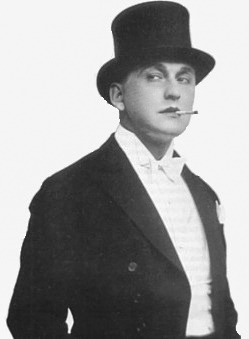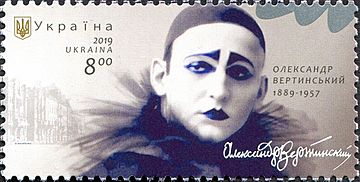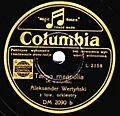Alexander Vertinsky facts for kids
Quick facts for kids
Alexander Vertinsky
|
|
|---|---|
 |
|
| Background information | |
| Native name |
Александр Вертинский
|
| Birth name | Alexander Nikolayevich Vertinsky |
| Born | 21 March 1889 Kiev, Kiev Governorate, Russian Empire |
| Died | 21 May 1957 (aged 68) Leningrad, RSFSR, USSR |
| Occupation(s) | singer, poet, actor, composer |
| Years active | 1916–1957 |
Alexander Nikolayevich Vertinsky (Russian: Александр Николаевич Вертинский, 21 March 1889 — 21 May 1957) was a famous Russian and Soviet artist. He was a talented poet, singer, composer, and actor. Vertinsky had a big impact on how artistic songs were performed in Russia.
Contents
Alexander Vertinsky: Early Life and Beginnings
Alexander Vertinsky and his older sister Nadezhda were born in Kiev (which is now in Ukraine). Their parents couldn't get married because his father's first wife would not agree to a divorce. So, his father had to officially adopt his own children. Both of his parents were part of the Russian Orthodox Church.
His father, Nikolai Petrovich Vertinsky (1845—1894), came from a family of railway workers. He was a well-known lawyer, especially popular with poor people. Alexander said his father often defended them for free and even helped them with money. He also sometimes wrote for newspapers.
Alexander believed he was mostly Russian, but thought he might have some Polish family too. He also knew he had some Ukrainian background. He even spoke Ukrainian, and people noticed his accent.
Alexander's mother, Eugenia Stepanovna Skolatskaya, came from a noble family. But her parents didn't approve of her having children without being married. She died when Alexander was only three years old from an illness after surgery. Just two years later, his father also passed away from an illness. Alexander said his father was very sad after his mother's death and spent a lot of time at the cemetery.
Alexander was raised by his mother's sister, Maria Stepanovna. His sister Nadezhda was raised by another aunt. The aunts didn't want the brother and sister to meet. Alexander was even told his sister had died, and she was told the same about him. Years later, he found her name in a theater magazine and they finally got in touch.
In 1898, Alexander started at the First Kiev Gymnasium, a school for children from important families. But he was expelled from the second grade. He then moved to a less fancy school, the 4th Kiev Gymnasium. In 1905, he was expelled again from the fifth grade. Vertinsky didn't like school much.
He tried different jobs before he started making money by writing short stories for newspapers in Kiev. In 1912, Vertinsky and his sister moved to Moscow. He tried to join a famous theater, the Moscow Art Theatre, but he wasn't accepted.
From 1914 to 1916, he helped during World War I. He worked on a hospital train that helped wounded soldiers. He treated many seriously injured soldiers, dressing about 35,000 wounds in total.
By 1916, Vertinsky began performing as a character called Pierrot. He would powder his face white and sing short, sad songs. Each song told a little story with a sad ending. People started calling him the "Russian Pierrot." He became very famous, and many tried to copy him. He was loved by audiences, even though some newspapers criticized him.
While his singing career was growing, he also acted in small roles in silent movies. He became good friends with another actor, Ivan Mosjoukine. One of his famous songs, "Your Fingers Smell of Frankincense," was written for a film star named Vera Kholodnaya. Before the October Revolution, Vertinsky created a new stage character, the Black Pierrot. He toured Russia and Ukraine, singing stylish songs about city life and travel, like "Kokainetka" and "Tango Magnolia." An American historian, Richard Stites, said that Vertinsky's songs were full of images of palm trees, tropical birds, and faraway places. These were exactly the things people wanted to hear about during wartime.
Alexander Vertinsky: Life and Career Abroad
In November 1920, Vertinsky decided to leave Russia, along with many of his fans. He performed in Constantinople (now Istanbul) and then toured Bessarabia in Romania. There, he was wrongly accused of being a Soviet agent.
In 1923, he performed in Poland and Germany. After that, he moved to Paris, France. For nine years, he performed in cabarets in Montmartre for Russians who had also left their home country.
In 1926, Vertinsky made one of the first recordings of the song "Dorogoi dlinnoyu" (meaning "Endless Road"). This song later became a huge hit in 1968 for Mary Hopkin with English lyrics, known as "Those Were the Days".
After performing successfully in the Middle East, Vertinsky moved to the United States. Many wealthy Russians had moved there too. He performed for audiences that included famous people like Sergei Rachmaninoff, Feodor Chaliapin, and Marlene Dietrich. But the Great Depression made things hard, so he moved to Shanghai, China. It was in China that he met his wife, and his oldest daughter, Marianna, was born there.
Alexander Vertinsky: Final Years and Legacy
In 1943, the Soviet government allowed Vertinsky to return to Russia. Even though the media didn't talk about him much, he performed about two thousand concerts across the Soviet Union. He traveled all over the country, from Sakhalin to Kaliningrad.
To support his family, he also acted in Soviet films. He often played roles as old-fashioned noblemen, like in the movie "Anna on the Neck" (1955). He even won a major award, the Stalin Prize, in 1951 for his role as a cardinal in the film "The Doomed Conspiracy."
Alexander Vertinsky passed away on 21 May 1957 from heart failure. He was at the Hotel Astoria in Leningrad right after his last performance. He was buried at the Novodevichy Cemetery in Moscow. Vertinsky is still an important figure in Russian music. Other famous artists like Vladimir Vysotsky and Boris Grebenshchikov have performed his songs.
Family
Alexander Vertinsky was married twice. His first marriage was to Irina Vladimirovna Vertidis from 1923 to 1941. From 1942 until his death, he was married to the actress and artist Lidiya Vertinskaya (1923—2013).
Alexander and Lidiya had two daughters: Marianna Vertinskaya (born 1943) and Anastasiya Vertinskaya (born 1944). Both of his daughters grew up to become successful actresses.
Marianna was married three times and has two daughters. Anastasiya was married to the film director Nikita Mikhalkov and they had a son, Stepan Mikhalkov, who is also an actor.
Legacy
A small planet, 3669 Vertinskij, was discovered in 1982 by a Soviet astronomer. It was named after Alexander Vertinsky to honor him.
Images for kids
 | Audre Lorde |
 | John Berry Meachum |
 | Ferdinand Lee Barnett |



